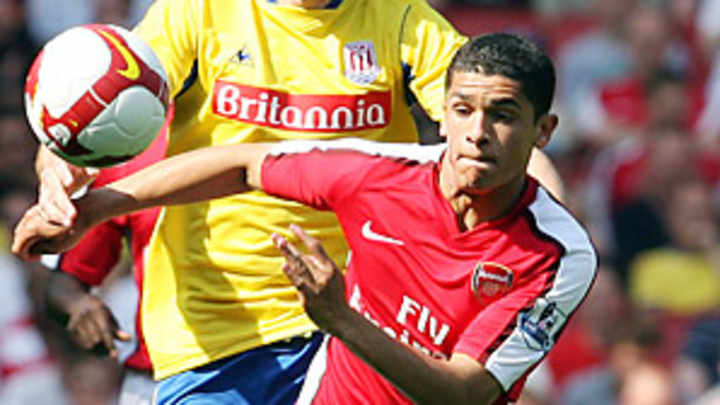Arsenal opens EPL full of questions

On the pitch, it emphasized youth and technique above all else, scouring the world to pick up potential, usually at a knockdown price, and turning that potential into stardom.
But the biggest selling point to neutrals was the football itself: creative, stressing innovative passing and movement, always pleasing to the eye and effective at the other end.
The linchpin, of course, was the manager, Arsène Wenger, though others, most notably David Dein, played a crucial role. Arsenal presented a blueprint -- winning games while being easy on the eye and doing so on a budget -- that other clubs tried, mostly unsuccessfully, to copy.
But now, the landscape has changed and it's getting increasingly difficult for the Gunners to compete in the way they did. In three of the past four seasons, Arsenal finished fourth (it was third in the other). In that time frame, a familiar storyline has emerged: Patrick Vieira, Lauren, Ashley Cole, Sol Campbell, Robert Pirès, Edu, Thierry Henry, Freddie Ljungberg, José Antonio Reyes, Mathieu Flamini, Jens Lehmann and Gilberto Silva left, most of them at a profit. A gaggle of up-and-comers came in, most of them successful. Emanuel Adebayor, Abou Diaby, Theo Walcott, Carlos Vela, Alex Song, Denílson, Eduardo, Bacary Sagna, Samir Nasri and Aaron Ramsey -- as well as a few cut-rate veterans such as William Gallas and Tomas Rosicky -- all joined, as did Andrei Arshavin, the club's only major break-the-bank signing.
It's a similar blueprint to what worked for Arsenal before, but it simply hasn't been as effective. Theories abound. Some contend that Henry and Vieira were, after all, one-offs, global superstars who you simply can't plan to unearth on the cheap (Cesc Fàbregas is probably the only current Gooner on their level). Some claim that competition for young talent -- especially abroad -- has made it much tougher for Arsenal, with its budgetary restrictions, to compete. Some say the opposition has largely figured out Arsenal's style of play, which arguably has not evolved over the years. And still others believe that Arsenal is actually as good as it has been at any time during the Wenger era, but that the likes of Chelsea, Liverpool and Manchester United have benefited from massive investment and therefore have become even better.
There's probably some truth to all those theories. But the fact of the matter is Wenger has a real challenge on his hands, and, as ever, he's marching to the beat of his own drummer. Exhibit A is in central defense. Last year, the Gallas-Kolo Touré partnership looked a bit battle-weary and mostly undersized. With Touré being sold to Manchester City, Wenger's solution has been to spend some $15 million on Thomas Vermaelen. He's a young and gifted defender, but at 5-foot-11, he's hardly the commanding defensive presence Arsenal's back four seemed to cry out for last season.
The other obvious unaddressed weakness is in central midfield. Denílson was pilloried in his role as holding midfielder last year; Song, who also featured in that position, didn't exactly pull up trees, either. Abou Diaby showed that he is more effective in an attacking role. Ramsey is still just 18 and he also doesn't seem a natural heir apparent to the likes of Vieira and Silva.
Meanwhile, up front, the sale of Adebayor to (who else?) City for $37 million was a great bit of business, but his goals (34 in 62 Premiership games over the past two seasons) will need to be replaced. Wenger has pursued Bordeaux's Marouane Chamakh for much of the summer, but there are serious doubts over whether he can fill Adebayor's shoes. And, at 25, it's unlikely that he'll suddenly blossom into a top-drawer center forward.
The flip side to all this is that Arsenal remains a young and talented side, and if the kids kick it up a notch, the Gunners will only get better. Johan Djorou has been inconsistent, but he's still just 22 and certainly has the physical skills to be a dominant center-half. Denílson and Song are 21 and 22, respectively; you would think they, too, will only improve and maybe provide the defensive "oomph" that has been lacking in the midfield. If Robin van Persie stays healthy -- that's a big if, as in the past five seasons he has started less than half of Arsenal's league games -- you could see him lining up at center forward with Arshavin behind and some combination of Walcott, Rosicky, Eduardo, Nicklas Bendtner, Nasri and Vela behind, which would be more than serviceable.
Of course, all of this is based on "ifs." And, once again, Arsenal goes into the season filled with uncertainty and questions. Perhaps the biggest of them all is this: Having cashed in royally on Adebayor and Touré, why aren't those funds being used to further strengthen the team?
